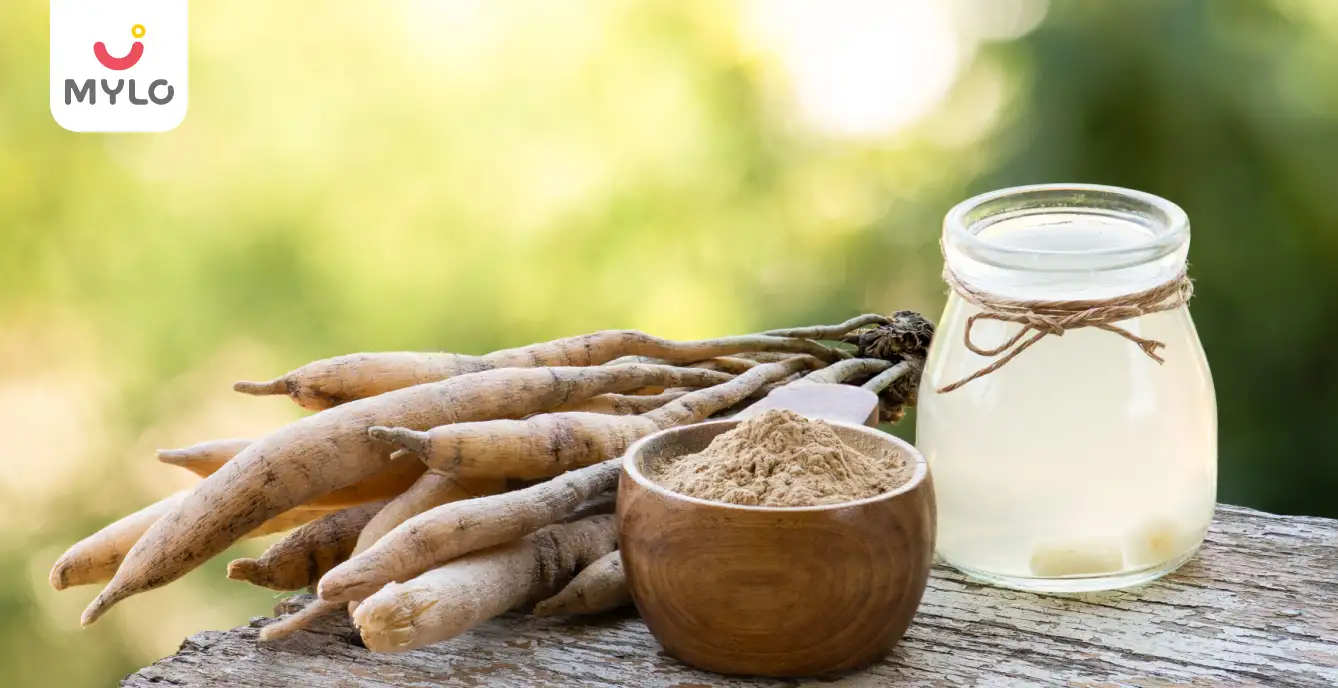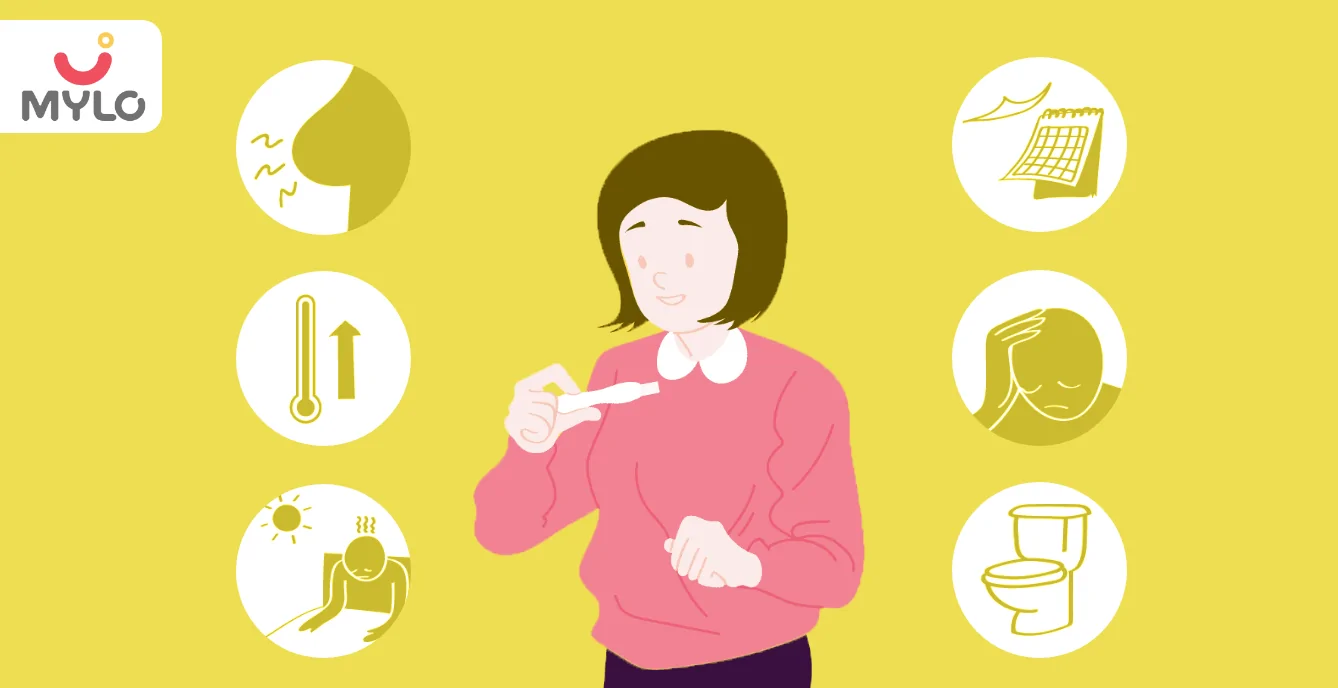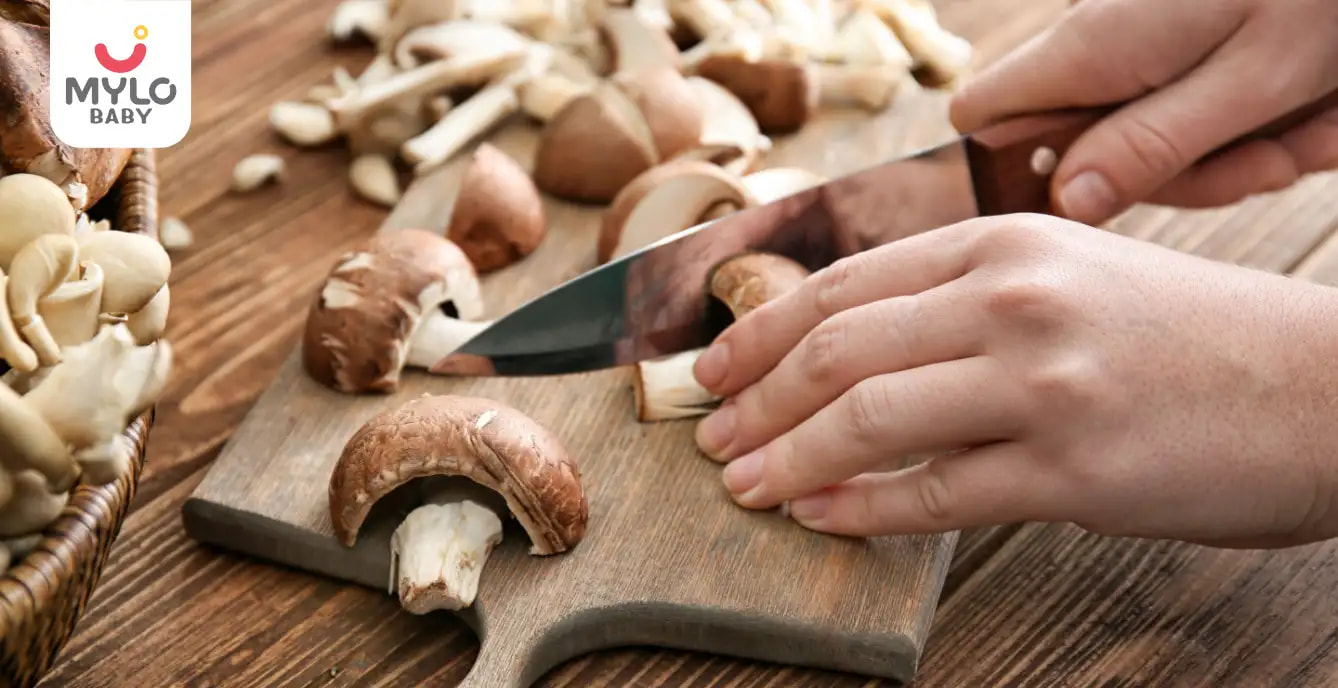- Home

- Breastfeeding & Lactation

- Mushroom During Breastfeeding: A Comprehensive Guide for New Moms
In this Article
Breastfeeding & Lactation
Mushroom During Breastfeeding: A Comprehensive Guide for New Moms
Updated on 20 December 2024
Breastfeeding is an essential part of a new mother's journey, as it provides vital nutrients and antibodies to her baby. During this phase, it is crucial for mothers to maintain a healthy diet to ensure their own well-being and the proper development of their child. One common question that often arises is whether it is safe for mothers to consume mushroom during breastfeeding.
In this article, we will explore the benefits of mushrooms for breastfeeding mothers, reasons to exercise caution, and precautions that should be followed when including mushrooms in the diet while breastfeeding.
Can Breastfeeding Mothers Eat Mushrooms?
Many new mothers wonder can I eat mushrooms while breastfeeding. The good news is that mushrooms are generally considered safe to consume during this period. In fact, mushrooms can offer several nutritional benefits that can aid in a mother's postpartum recovery and provide essential nutrients to her baby through breast milk.
What are the Benefits of Mushroom for Breastfeeding Mothers?
Here are some benefits of consuming mushrooms for breastfeeding moms:
1. Enhanced Immune System
Mushrooms are rich in antioxidants, vitamins, and minerals that can boost a breastfeeding mother's immune system. This can help prevent common illnesses and infections, allowing her to stay healthy and continue providing nourishment to her baby.
2. Improved Digestion
Mushrooms are a good source of dietary fiber, which can aid in digestion and prevent constipation, a common issue faced by many new mothers. Additionally, they contain enzymes that can promote the breakdown of food, making it easier for the body to absorb nutrients.
3. Increased Energy
The iron content in mushrooms can help combat fatigue and boost energy levels in breastfeeding mothers. This is particularly important as the demands of caring for a newborn can be physically exhausting.
4. Nutrient-Rich
Mushrooms are a low-calorie food that is rich in essential nutrients such as vitamins (B vitamins, vitamin D) and minerals (selenium, potassium). These nutrients can contribute to a mother's overall well-being and support her baby's growth and development.
5. Mood Enhancement
Some mushroom varieties, such as shiitake and maitake, contain compounds that have been linked to improved mood and reduced stress levels. This can be beneficial for new mothers who may experience postpartum depression or anxiety.
Reasons to Avoid Mushroom During Breastfeeding
While mushrooms have several benefits, here are some reasons to avoid mushroom for breastfeeding mother:
1. Allergies
While rare, some individuals may be allergic to mushrooms. If a breastfeeding mother has a known mushroom allergy, it is best to avoid mushrooms altogether to prevent any adverse reactions in both herself and her baby.
2. Contaminants
Mushrooms have a high water content, making them susceptible to absorbing environmental pollutants and toxins. To ensure safety, it is important to source mushrooms from reliable and reputable suppliers.
3. Gastrointestinal Upset
Certain mushroom varieties, such as wild mushrooms, can cause gastrointestinal distress, including stomach pain, nausea, and diarrhea. It is important to only consume mushrooms that have been properly identified and prepared.
4. Medication Interaction
Some medications may interact negatively with compounds found in mushrooms. Breastfeeding mothers who are taking medication should consult with their healthcare provider to determine if consuming mushrooms is safe for them.
5. Indigestible Chitin
Mushrooms contain a compound called chitin, which is indigestible for humans. While this may not pose a significant problem, excessive consumption of mushrooms could potentially lead to digestive discomfort.
You may also like: A Mom's Guide to Consuming Maggi During Breastfeeding
Precautions to Follow When Eating Mushroom While Breastfeeding
Here are some tips to keep in mind while eating mushrooms on your breastfeeding journey:
1. Moderation
As with any food, moderation is key. It is recommended to consume mushrooms in moderation and in combination with a varied and balanced diet.
2. Proper Cooking
Ensure that mushrooms are properly cooked before consumption to eliminate any potential bacteria or contaminants. Cooking also helps break down the chitin present in mushrooms, making them easier to digest.
3. Identification
If foraging for wild mushrooms, it is essential to have accurate identification skills or consult an expert to avoid consuming toxic varieties. It is generally safer to purchase mushrooms from trusted sources.
4. Hygiene
Practice good hygiene when handling mushrooms to prevent cross-contamination and the spread of harmful bacteria. Wash mushrooms thoroughly before cooking or consuming.
5. Monitor Baby's Reactions
If a breastfeeding mother consumes mushrooms for the first time, it is important to monitor her baby for any signs of discomfort or allergic reactions. If any adverse reactions occur, it is best to consult a healthcare professional.
You may also like: A Guide for Moms Consuming Jackfruit during Breastfeeding
Final Thoughts
Consuming mushroom during breastfeeding can offer numerous benefits, such as an enhanced immune system, improved digestion, increased energy levels, and mood enhancement. However, it is essential to exercise caution and follow certain precautions to ensure the safety and well-being of both the mother and her baby. By consuming mushrooms in moderation, properly cooking them, and being mindful of potential allergies or contaminants, breastfeeding mothers can enjoy the nutritional advantages that mushrooms provide.
Reference
1. Lien TY, Goldman RD. (2011). Breastfeeding and maternal diet in atopic dermatitis. Can Fam Physician.
2. Jeong G, Park SW, Lee YK, Ko SY, Shin SM. (2017). Maternal food restrictions during breastfeeding. Korean J Pediatr.
3. Karcz K, Lehman I, Królak-Olejnik B. (2020). Foods to Avoid While Breastfeeding? Experiences and Opinions of Polish Mothers and Healthcare Providers. Nutrients.



Written by
Anandita Sharma
Drawing on more than a decade of expertise in administration, Anandita Sharma currently serves as a content operations e
Read MoreGet baby's diet chart, and growth tips

Related Articles
How Respiratory Syncytial Virus (RSV) Impacts Premature Babies Differently: What Every Parent Needs To Know
Adverbs: A Comprehensive Guide to help small children learn the usage of adverbs
Expand Your Child's Vocabulary with words that start with X: Easy, Positive, and Engaging Words, Animals, Countries, and Fruits
Unlocking Language Proficiency: The Ultimate Guide to Top 100 Sight Words for Kindergarten and Beyond
Related Questions
Influenza and boostrix injection kisiko laga hai kya 8 month pregnancy me and q lagta hai ye plz reply me

Hai.... My last period was in feb 24. I tested in 40 th day morning 3:30 .. That is faint line .. I conculed mylo thz app also.... And I asked tha dr wait for 3 to 5 days ... Im also waiting ... Then I test today 4:15 test is sooooo faint ... And I feel in ma body no pregnancy symptoms. What can I do .

Baby kicks KB Marta hai Plz tell mi

PCOD kya hota hai

How to detect pcos

RECENTLY PUBLISHED ARTICLES
our most recent articles

Growth & Development
Preventing Respiratory Syncytial Virus (RSV) In Preemies: Essential Steps For New Parents

Growth & Development
How Respiratory Syncytial Virus (RSV) Impacts Premature Babies Differently: What Every Parent Needs To Know

Health & Wellness
Unlocking the Hidden Potential: 8 Incredible Shatavari Powder Uses for Men and Women

Hormones
Are You Aware of These 11 Early Signs and Symptoms of Pregnancy?

General Father
Top 5 tips to build a budget-friendly nursery for your little one

Teething
Toddler Teething: What to Expect and How to Help
- Adverbs: A Comprehensive Guide to help small children learn the usage of adverbs
- Expand Your Child's Vocabulary with words that start with X: Easy, Positive, and Engaging Words, Animals, Countries, and Fruits
- Unlocking Language Proficiency: The Ultimate Guide to Top 100 Sight Words for Kindergarten and Beyond
- Exploring Common Words that Start with P to Enhance Vocabulary in Small Children
- 100+ Common Words that start with L to Enhance the Vocabulary of Small Children
- 100 Common Words that start with 'C' for Small Children
- List of 100+ Common Words that start with 'D' for Small Children
- Top 100 Baby Girl Names 2024
- The Ultimate Collection of Muslim Baby Girl Names and Their Meanings 2024.
- Top 100 Baby Boy Names 2024
- 100+ Collection of Baby Boy Names Hindu and Their Meanings 2024
- The Ultimate Collection of Baby Girl Names Indian 2024
- 100 Common Words that start with 'S' for enhancing vocabulary in small children
- List of Most Common Words that start with v for small children


AWARDS AND RECOGNITION
Mylo wins Forbes D2C Disruptor award
Mylo wins The Economic Times Promising Brands 2022
AS SEEN IN
















At Mylo, we help young parents raise happy and healthy families with our innovative new-age solutions:
- Mylo Care: Effective and science-backed personal care and wellness solutions for a joyful you.
- Mylo Baby: Science-backed, gentle and effective personal care & hygiene range for your little one.
- Mylo Community: Trusted and empathetic community of 10mn+ parents and experts.
Product Categories
baby carrier | baby soap | baby wipes | stretch marks cream | baby cream | baby shampoo | baby massage oil | baby hair oil | stretch marks oil | baby body wash | baby powder | baby lotion | diaper rash cream | newborn diapers | teether | baby kajal | baby diapers | cloth diapers |









